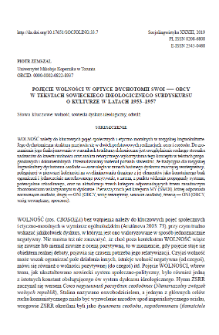- Search in all Repository
- Literature and maps
- Archeology
- Mills database
- Natural sciences
Advanced search
Advanced search
Advanced search
Advanced search
Advanced search

Object
Title: The term of freedom as perceived in the us-them dichotomy in texts of the soviet ideological subdiscourseabout culture in 1953–1957
Publisher:
Instytut Języka Polskiego Polskiej Akademii Nauk
Place of publishing:
Abstract:
The term of freedom belongs to crucial social, ethical and moral issues in the Russian languaculture.Its dichotomous structure is reflected in two basic embodiments: воля and свобода. An issue crucialfor understanding its functioning in conditions of totalitarianism is taking into account the actual perceptionof freedom by senders, and an analysis of the rhetorical use of this concept in propaganda and documentarytexts. On a basis of the analysed material it can be said that the dichotomy of свобода — воля, traditionalfor the Russian languaculture, underwent significant reinterpretation under the analysed discourse, firstby elimination of its second components as implying a lack of restrictions, while having a positive meaning,and thus being potentially harmful from the system propaganda point of view, and then by updating the threecategories corresponding to three basic groups mentioned in the discourse. US (FRIENDS) is the firstof these categories, to which настоящая свобода corresponds, THEM (STRANGERS , an external enemyмнимая свобода) form the second of these categories, while the third one describes THEM (STRANGERS, an internal enemy, произвол).
Relation:
Volume:
Start page:
End page:
Detailed Resource Type:
Format:
Resource Identifier:
10.17651/SOCJOLING.33.7 ; oai:rcin.org.pl:164514
Language:
Language of abstract:
Rights:
Terms of use:
Copyright-protected material. May be used within the limits of statutory user freedoms
Access:
Object collections:
- Digital Repository of Scientific Institutes > Partners' collections > Institute of Polish Language PAS > Filds of science
- Digital Repository of Scientific Institutes > Partners' collections > Institute of Polish Language PAS > Serials
- Digital Repository of Scientific Institutes > Partners' collections > Institute of Polish Language PAS > Filds of science > Humanities
- Digital Repository of Scientific Institutes > Partners' collections > Institute of Polish Language PAS > Filds of science > Humanities > Linguistics
- Digital Repository of Scientific Institutes > Partners' collections > Institute of Polish Language PAS > Filds of science > Humanities > Linguistics > Sociolinguistics
- Digital Repository of Scientific Institutes > Partners' collections > Institute of Polish Language PAS > Offprint
- Digital Repository of Scientific Institutes > Literature > Journals/Articles
Last modified:
Mar 5, 2021
In our library since:
Mar 3, 2021
Number of object content downloads / hits:
114
All available object's versions:
https://rcin.org.pl./publication/198860
Show description in RDF format:
Show description in RDFa format:
Show description in OAI-PMH format:
Objects Similar
Zemszał, Piotr
Tyszkiewicz, Barbara
Madajczyk, Czesław (1921–2008)
Kriegseisen, Wojciech (1955– )
Czarnecka, Małgorzata Nidzgorska-Lencewicz, Jadwiga
Ogonowski, Zbigniew (1924–2018)
Motyka, Grzegorz (1967– )
Wolsza, Tadeusz (1956– )

 INSTYTUT ARCHEOLOGII I ETNOLOGII POLSKIEJ AKADEMII NAUK
INSTYTUT ARCHEOLOGII I ETNOLOGII POLSKIEJ AKADEMII NAUK
 INSTYTUT BADAŃ LITERACKICH POLSKIEJ AKADEMII NAUK
INSTYTUT BADAŃ LITERACKICH POLSKIEJ AKADEMII NAUK
 INSTYTUT BADAWCZY LEŚNICTWA
INSTYTUT BADAWCZY LEŚNICTWA
 INSTYTUT BIOLOGII DOŚWIADCZALNEJ IM. MARCELEGO NENCKIEGO POLSKIEJ AKADEMII NAUK
INSTYTUT BIOLOGII DOŚWIADCZALNEJ IM. MARCELEGO NENCKIEGO POLSKIEJ AKADEMII NAUK
 INSTYTUT BIOLOGII SSAKÓW POLSKIEJ AKADEMII NAUK
INSTYTUT BIOLOGII SSAKÓW POLSKIEJ AKADEMII NAUK
 INSTYTUT CHEMII FIZYCZNEJ PAN
INSTYTUT CHEMII FIZYCZNEJ PAN
 INSTYTUT CHEMII ORGANICZNEJ PAN
INSTYTUT CHEMII ORGANICZNEJ PAN
 INSTYTUT FILOZOFII I SOCJOLOGII PAN
INSTYTUT FILOZOFII I SOCJOLOGII PAN
 INSTYTUT GEOGRAFII I PRZESTRZENNEGO ZAGOSPODAROWANIA PAN
INSTYTUT GEOGRAFII I PRZESTRZENNEGO ZAGOSPODAROWANIA PAN
 INSTYTUT HISTORII im. TADEUSZA MANTEUFFLA POLSKIEJ AKADEMII NAUK
INSTYTUT HISTORII im. TADEUSZA MANTEUFFLA POLSKIEJ AKADEMII NAUK
 INSTYTUT JĘZYKA POLSKIEGO POLSKIEJ AKADEMII NAUK
INSTYTUT JĘZYKA POLSKIEGO POLSKIEJ AKADEMII NAUK
 INSTYTUT MATEMATYCZNY PAN
INSTYTUT MATEMATYCZNY PAN
 INSTYTUT MEDYCYNY DOŚWIADCZALNEJ I KLINICZNEJ IM.MIROSŁAWA MOSSAKOWSKIEGO POLSKIEJ AKADEMII NAUK
INSTYTUT MEDYCYNY DOŚWIADCZALNEJ I KLINICZNEJ IM.MIROSŁAWA MOSSAKOWSKIEGO POLSKIEJ AKADEMII NAUK
 INSTYTUT PODSTAWOWYCH PROBLEMÓW TECHNIKI PAN
INSTYTUT PODSTAWOWYCH PROBLEMÓW TECHNIKI PAN
 INSTYTUT SLAWISTYKI PAN
INSTYTUT SLAWISTYKI PAN
 SIEĆ BADAWCZA ŁUKASIEWICZ - INSTYTUT TECHNOLOGII MATERIAŁÓW ELEKTRONICZNYCH
SIEĆ BADAWCZA ŁUKASIEWICZ - INSTYTUT TECHNOLOGII MATERIAŁÓW ELEKTRONICZNYCH
 MUZEUM I INSTYTUT ZOOLOGII POLSKIEJ AKADEMII NAUK
MUZEUM I INSTYTUT ZOOLOGII POLSKIEJ AKADEMII NAUK
 INSTYTUT BADAŃ SYSTEMOWYCH PAN
INSTYTUT BADAŃ SYSTEMOWYCH PAN
 INSTYTUT BOTANIKI IM. WŁADYSŁAWA SZAFERA POLSKIEJ AKADEMII NAUK
INSTYTUT BOTANIKI IM. WŁADYSŁAWA SZAFERA POLSKIEJ AKADEMII NAUK


































